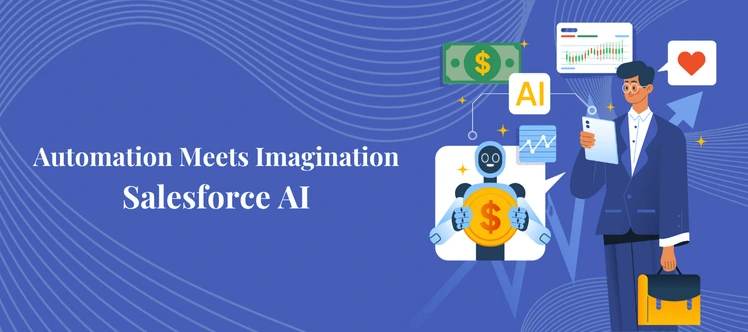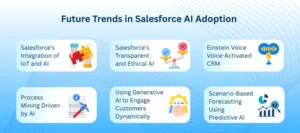
Mastering Salesforce AI Implementation: A Quick Guide
Consider a CRM that not only keeps track of your client information but also acts, thinks, and anticipates, turning every interaction into a chance for improvement. That is the Salesforce AI implementation’s power. AI is now a game-changer for companies wanting to work smarter, not harder. Gone are the days when it was only a futuristic idea. Automating repetitive operations, seeing hidden trends, and providing individualized experiences at scale are all made possible by utilizing Salesforce’s artificial intelligence. This brief article explores how to use robust Salesforce AI technologies and a tried-and-true Salesforce AI adoption strategy to transform your workflows.
What is Salesforce AI Implementation?
Implementing Salesforce AI is a strategic move towards smarter, faster, and more personalized customer relationships, not just adding AI to your CRM. Essentially, the process is about leveraging Salesforce AI frameworks to enhance every customer touchpoint along the customer journey, automate work, and build predictive insights.
Salesforce Einstein, the core of Salesforce artificial intelligence, is a robust set of intelligent tools that act on data. Einstein applies machine learning, natural language processing, and predictive analytics to help teams make faster, smarter decisions in marketing, sales, or customer service.
Let’s examine what makes Salesforce AI implementation so effective:
AI Agents: Automation’s Intelligence
AI agents are self-governing, intelligent machines that perform tasks using real-time data and large language models (LLMs). They offer contextual understanding, multi-step reasoning, and proactive execution capabilities. By enabling low-code customisation and automating intricate processes and client interactions. These Salesforce AI agents can increase operational effectiveness and foster high levels of engagement.
Automation Driven by AI: Doing Away with Duplicate Tasks
Difficult chores like data input, email answers, and lead routing are handled by automation through Salesforce AI implementation. Every interaction teaches it something new, and it keeps becoming better. This increases team productivity, speeds up business procedures, and frees up your employees to concentrate on strategic decision-making rather than day-to-day tasks.
Einstein Copilot: AI Assistant for Conversation
Einstein Copilot is a virtual assistant with AI tools capabilities that is integrated into Salesforce apps. Users may easily create case summaries, email drafts, and marketing strategies thanks to its understanding of natural language and voice commands. Across departments, this conversational interface provides a more intuitive user experience and increases productivity.
Einstein Studio: Create Personalized AI Models Without Writing Any Code
Business people with no prior coding knowledge can create and implement AI models using Einstein Studio. It runs inside Salesforce Data Cloud and facilitates connectivity with Azure and OpenAI. It speeds up Salesforce AI implementation by enabling non-technical people to develop powerful AI models, from batch processing to creating prompts.
MuleSoft AI Connect: Integrating Information Throughout Systems
MuleSoft AI Connect facilitates smooth data flow by connecting Salesforce with external platforms. It guarantees AI models have real-time access to data, which improves the intelligence and responsiveness of your workflows. It facilitates data-driven decision-making and connected corporate processes through the management of APIs and synchronization systems.
Data Graphs: An Integrated Database
Data Graphs, which are powered by Salesforce Data Cloud, combine unstructured and structured data. With precise, up-to-date data, this unified data platform powers AI models and automation tools. It makes it possible for there to be just one source of truth, which promotes greater business insights and more informed judgments.
AI-Powered Virtual Assistants and Chatbots: Round-the-Clock Intelligent Assistance
Salesforce’s AI-powered chatbots interact with clients at any time by using contextual memory and natural language processing (NLP). These bots lower expenses, manage service calls effectively, and fix problems more quickly. They increase client happiness by providing prompt, reliable, and beneficial assistance.
Einstein for Developers: Integrating AI into the Development Process
Throughout the development process, Einstein for Developers provides helpful tools. It greatly lowers errors through the use of natural language code generation, autocomplete, bug detection, and unit tests. This increases the productivity of Salesforce development services and results in deployments that are quicker and of greater quality.
Smarter Salesforce AI Adoption: A Strategic Framework That Works
Salesforce AI implementation provides insightful data, but only when used carefully. This framework describes the necessary actions to introduce AI in a way that steers clear of typical pitfalls and produces quantifiable results.
Evaluate AI Readiness: Systems, Skills & Data
Determine whether your company is actually prepared for AI before launching into implementation. Verify that your data is comprehensive, clean, and organized correctly. Make sure everyone on your team is aware of the function, potential, and constraints of AI. Examine whether AI workloads can be supported by your Salesforce infrastructure. This readiness check helps you avoid being caught off guard in the middle of your project by highlighting technical shortcomings and informing your plan.
Define High-Impact AI Use Cases
Begin by listing every possible area in which AI could benefit your company. Give priority to use cases with little complexity and quick return on investment. Prioritize resolving pressing business issues, particularly in divisions like marketing, sales, and customer support. Select examples that strike a balance between immediate gains and future expansion prospects. In this manner, you allocate resources where they will have the biggest impact right away.
Design a Scalable AI Architecture
Plan how Salesforce AI implementation will fit into your current Salesforce environment. Define the data sources, workflows, and system integrations required. Map out how different parts of the architecture will work together securely. Consider scalability and flexibility to accommodate future changes. A well-thought-out Salesforce implementation strategy ensures seamless integration and minimizes disruptions down the line.
Train, Test & Fine-Tune Your Models
To teach AI models from real-world instances, use your company’s data. Verify the forecasts by contrasting them with the actual results. Models should be improved and retested to make sure performance meets business requirements. Your model’s results will be more dependable the more accurate it is. Gaining trust and generating useful outcomes from your AI systems depends on this stage.
Launch with a Controlled Rollout
Implement the AI features within your Salesforce system step-by-step. Carefully integrate them into your existing setup and test thoroughly at each stage. Train your teams on how to use the new Salesforce AI frameworks effectively. Start small, then gradually expand functionality. This phased approach reduces risk and ensures a smooth transition to AI-powered operations.
Test in Real Time: Pilot Groups & Feedback
Roll out your AI solution to a small group of users first. Observe how they interact with it and gather feedback. Identify areas for improvement and make adjustments based on real usage, not assumptions. This real-time testing helps optimize the system before full deployment. Continuous feedback loops drive lasting success and ongoing refinement.
Expand with Confidence: Scale & Sustain
Once the pilot proves successful, expand Salesforce AI implementation usage across departments. Monitor system performance closely and resolve any scaling issues early. Keep evaluating whether the AI tools are delivering value and making a measurable impact. Stay ready to evolve with new data, user feedback, and feature updates. Scaling smartly ensures long-term success and sustainability.
Future Trends in Salesforce AI Adoption

The Salesforce AI deployment landscape is still changing quickly as 2025 approaches. Businesses that make strategic investments in Salesforce AI adoption will maintain their agility and competitiveness through predictive analytics and dynamic customer experiences. What lies ahead is as follows:
Using Generative AI to Engage Customers Dynamically
Salesforce’s artificial intelligence is revolutionizing personalization. Intelligent chat responses, hyper-personalized emails, and content catered to specific client demands are being created with tools like Einstein GPT. This cutting-edge Salesforce AI solution improves customer satisfaction and loyalty by revolutionizing how companies interact with their customers.
Scenario-Based Forecasting Using Predictive AI
Salesforce AI is making scenario-based forecasting possible in addition to sales prediction. Salesforce development services are currently concentrated on creating models that predict consumer preferences, market trends, and competition movements using historical data and behavioral patterns, giving firms a competitive advantage.
Process Mining Driven by AI
Intelligent process mining is now a part of the Salesforce AI application to improve workflow efficiency. AI tools find bottlenecks and provide fixes by examining CRM data. Faster service delivery and more efficient operations are advantageous to businesses and are essential elements of a successful Salesforce implementation strategy.
Einstein Voice Voice-Activated CRM
With voice-activated features, Salesforce artificial intelligence is growing increasingly intuitive. Users can utilize natural language instructions to communicate with the CRM with Einstein Voice. This tool streamlines daily tasks and increases field productivity, from creating reports to updating records.
Salesforce’s Integration of IoT and AI
Smarter customer experiences are being produced by the combination of Salesforce AI implementation and IoT. Companies may now anticipate maintenance problems, provide proactive support, and streamline operations by analyzing real-time data from linked equipment. The use of Salesforce AI in the future is on the rise.
Salesforce’s Transparent and Ethical AI
Transparency is essential as AI gets more and more integrated into CRM. These days, Salesforce AI is being developed with tools that describe the decision-making process. Enhancing user trust is a primary goal of any Salesforce deployment plan, and this ethical approach supports global compliance, including the CCPA and GDPR.
Conclusion
More than just technology is needed to successfully deploy Salesforce AI; a well-defined Salesforce implementation services that is in line with user readiness and business objectives is also necessary. From evaluating preparedness and ranking use cases to expanding and maintaining AI projects, companies may optimize their investment and achieve more intelligent results by taking a methodical approach. Future-proofing your Salesforce CRM will require embracing breakthroughs like generative AI, predictive analytics, and ethical transparency as AI develops further.
This process can be accelerated by collaborating with knowledgeable Salesforce development services like AnavClouds Software Solutions. These implementation partners will guarantee that your Salesforce AI implementation solutions provide quantifiable results and a sustainable competitive edge. Book a free consultation today and learn more!
FAQs
What is Salesforce AI, and how can it support my business?
Salesforce AI leverages advanced technology to automatically carry out tasks, forecast customer behavior, and personalize communications, enabling your business to operate more effectively to promote positive customer experiences.
Can I personalize Salesforce AI for my business?
Yes, Salesforce provides tools like Einstein Studio for training and personalizing AI models for whatever purposes you need, even with no coding experience. This helps create personalized AI solutions to support your specific business challenges and goals to enhance efficacy.
Does Salesforce AI integrate with other business systems?
Yes, using tools like MuleSoft AI Connect, Salesforce AI integrates with external systems to facilitate seamless data movement and continuous real-time connection. This improves accuracy and integration across your business.
Is Salesforce AI suitable for small businesses?
Yes, Salesforce AI scales to the size of your business. Small businesses can improve efficiency and predictive accuracy, and automation can work for you without a maximum upfront cost for support, which enables smaller organizations to compete faster with large businesses.
How often should I update Salesforce AI models?
Models should be periodically reviewed and updated with new data and user experiences to ensure accuracy and relevancy. Continuous updates ensure that AI is accurately performing as business needs change to improve operations.


